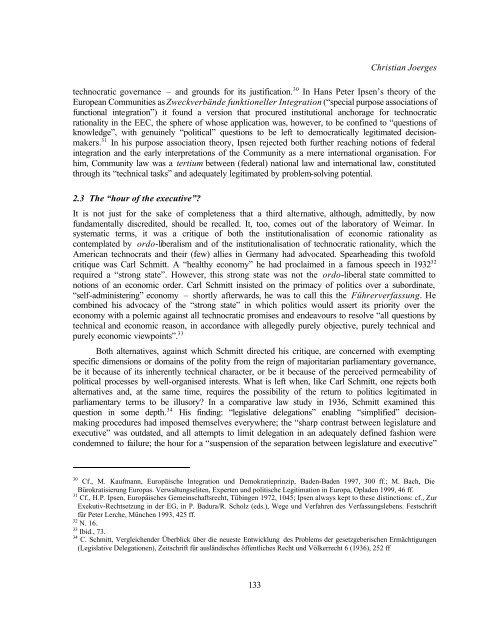Mountain or Molehill ?: - European University Institute
Mountain or Molehill ?: - European University Institute
Mountain or Molehill ?: - European University Institute
Create successful ePaper yourself
Turn your PDF publications into a flip-book with our unique Google optimized e-Paper software.
133<br />
Christian Joerges<br />
technocratic governance – and grounds f<strong>or</strong> its justification. 30 In Hans Peter Ipsen’s the<strong>or</strong>y of the<br />
<strong>European</strong> Communities as Zweckverbände funktioneller Integration (“special purpose associations of<br />
functional integration”) it found a version that procured institutional anch<strong>or</strong>age f<strong>or</strong> technocratic<br />
rationality in the EEC, the sphere of whose application was, however, to be confined to “questions of<br />
knowledge”, with genuinely “political” questions to be left to democratically legitimated decisionmakers.<br />
31 In his purpose association the<strong>or</strong>y, Ipsen rejected both further reaching notions of federal<br />
integration and the early interpretations of the Community as a mere international <strong>or</strong>ganisation. F<strong>or</strong><br />
him, Community law was a tertium between (federal) national law and international law, constituted<br />
through its “technical tasks” and adequately legitimated by problem-solving potential.<br />
2.3 The “hour of the executive”?<br />
It is not just f<strong>or</strong> the sake of completeness that a third alternative, although, admittedly, by now<br />
fundamentally discredited, should be recalled. It, too, comes out of the lab<strong>or</strong>at<strong>or</strong>y of Weimar. In<br />
systematic terms, it was a critique of both the institutionalisation of economic rationality as<br />
contemplated by <strong>or</strong>do-liberalism and of the institutionalisation of technocratic rationality, which the<br />
American technocrats and their (few) allies in Germany had advocated. Spearheading this twofold<br />
critique was Carl Schmitt. A “healthy economy” he had proclaimed in a famous speech in 1932 32<br />
required a “strong state”. However, this strong state was not the <strong>or</strong>do-liberal state committed to<br />
notions of an economic <strong>or</strong>der. Carl Schmitt insisted on the primacy of politics over a sub<strong>or</strong>dinate,<br />
“self-administering” economy – sh<strong>or</strong>tly afterwards, he was to call this the Führerverfassung. He<br />
combined his advocacy of the “strong state” in which politics would assert its pri<strong>or</strong>ity over the<br />
economy with a polemic against all technocratic promises and endeavours to resolve “all questions by<br />
technical and economic reason, in acc<strong>or</strong>dance with allegedly purely objective, purely technical and<br />
purely economic viewpoints”. 33<br />
Both alternatives, against which Schmitt directed his critique, are concerned with exempting<br />
specific dimensions <strong>or</strong> domains of the polity from the reign of maj<strong>or</strong>itarian parliamentary governance,<br />
be it because of its inherently technical character, <strong>or</strong> be it because of the perceived permeability of<br />
political processes by well-<strong>or</strong>ganised interests. What is left when, like Carl Schmitt, one rejects both<br />
alternatives and, at the same time, requires the possibility of the return to politics legitimated in<br />
parliamentary terms to be illus<strong>or</strong>y? In a comparative law study in 1936, Schmitt examined this<br />
question in some depth. 34 His finding: “legislative delegations” enabling “simplified” decisionmaking<br />
procedures had imposed themselves everywhere; the “sharp contrast between legislature and<br />
executive” was outdated, and all attempts to limit delegation in an adequately defined fashion were<br />
condemned to failure; the hour f<strong>or</strong> a “suspension of the separation between legislature and executive”<br />
30<br />
Cf., M. Kaufmann, Europäische Integration und Demokratieprinzip, Baden-Baden 1997, 300 ff.; M. Bach, Die<br />
Bürokratisierung Europas. Verwaltungseliten, Experten und politische Legitimation in Europa, Opladen 1999, 46 ff.<br />
31<br />
Cf., H.P. Ipsen, Europäisches Gemeinschaftsrecht, Tübingen 1972, 1045; Ipsen always kept to these distinctions: cf., Zur<br />
Exekutiv-Rechtsetzung in der EG, in P. Badura/R. Scholz (eds.), Wege und Verfahren des Verfassungslebens. Festschrift<br />
für Peter Lerche, München 1993, 425 ff.<br />
32<br />
N. 16.<br />
33<br />
Ibid., 73.<br />
34<br />
C. Schmitt, Vergleichender Überblick über die neueste Entwicklung des Problems der gesetzgeberischen Ermächtigungen<br />
(Legislative Delegationen), Zeitschrift für ausländisches öffentliches Recht und Völkerrecht 6 (1936), 252 ff

















